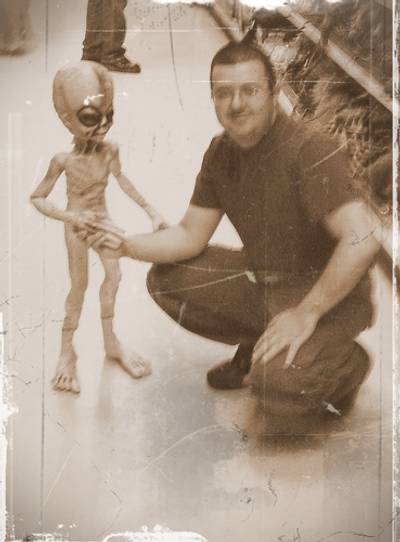
When the little green men make contact, we earthlings don't always know exactly how what to do. Do the spacemen come in peace or in war? Do we greet flying saucers with open arms or armed missiles? Do we conspire with them or do we believe the conspiracy theories? It all depends on what book you're reading. Sometimes we love our new alien neighbors, sometimes we can't wait to blow them out of the sky, and sometimes we don't know what the hell kind of weirdo space creature we're looking at. Humans. Aliens. Can't we all just get along?
The War of the Worlds by H.G. Wells, 2002, Modern Library Classics, originally published 1898 (Science Fiction Classics)

Back in the later days of the nineteenth century, there was an author named H.G. Wells who was way ahead of his time. He envisioned time travel (The Time Machine), advanced scientific experiments (The Invisible Man), and of course, alien invasions. The War of the Worlds begins when a silver spacecraft from Mars lands in the English countryside. Atmospheric disturbances are observed; curious crowds gather. But when the spaceship hisses open and alien arms bearing deathly ray-guns emerge, there's no doubt that war is on. Narrated by an observant and astonished everyman, the story of how humans fair against an advanced enemy they never knew existed is as riveting now as it was in 1898--or in 1938, when Orson Welles's radio broadcast of his own adaptation convinced a few unsuspecting listeners that the story was all too real. The War of the Worlds is the grandfather of alien stories, and as a certain Tom Cruise-Steven Spielberg-special-effects laden blockbuster recently proved, it's not the kind of story that we outgrow. Despite the old-fashioned setting, The War of the Worlds is about something we understand all too well today: The fear that we're not really as powerful as we think we are. It's a lot of food for thought (especially when you find out what the Martians eat). There are dozens of editions to read; one of the best was illustrated by quirky artist Edward Gorey in 1960 and reprinted by New York Review Books in 2005.
Childhood's End by Arthur C. Clarke, 2001, Del Ray Books, originally published 1953 (Science Fiction Classics)
When a massively superior alien race arrives on earth, things to much more smoother that you'd think. Because the Overlords aren't here to attack or conquer. Their one demand is world peace, and under their guidance (mysterious though it is) mankind is only too happy to oblige. But eventually the lack of any need to better the world starts to take its toll. There's no human creativity, no problem-solving, no invention--and the Overlords still won't explain why they're really here. Humanity is approaching a fork in the road and no one knows what lies at the end, much less which path to take. Childhood's End gives us the ultimate goal of peace on earth and dares to tell us that it ain't all its cracked up to be. Author Arthur C. Clarke is one of the most lauded science fiction writers to date, and his book pushes the boundaries of our expectations about ourselves, makes us think about what mankind might really be capable of, and suggests that what we want might not be what the universe wants. It's a risky premise, but the result is one of science fiction's literary masterpieces.
The White Mountains by John Christopher, 2003, Simon Pulse Books, originally published 1967 (Children's Fiction/ Science Fiction)
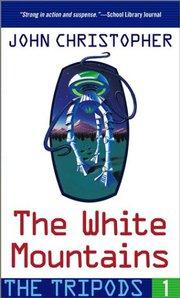
The Tripods have landed, taken over earth, and re-established the feudal lifestyle of lords and ladies and serfs and servants. It is harder for people to rebel, after all, when they're either living lives of ease or distracted by the day-to-day grind to survive. That the Tripods are barely understood (are they intelligent machines or machines driven by intelligent life?) certainly helps them rule, as does their annual Capping ceremonies. When boys and girls reach a certain age they are fitted with a metal mesh cap that provides the Tripods with a convenient element of mind control over hapless humans. Young Will Parker, son of hard-working English peasant folk, is disturbed by the changes in a beloved older cousin who is Capped. Suddenly rethinking everything he's been taught, Will opts to run for it. With a couple of other rebellious boys in tow, Will heads for the White Mountains where, legend has it, a group of un-Capped stalwarts survive. The journey is long and filled with the unexpected, the Tripods are on their trail, and there just might be some benefits to being Capped after all... The White Mountains is the first book in the classic Tripod Trilogy, a series that has been read by generation after generation since their publication in the late 1960s. Will is a strong character, realistically flawed and tempted, with difficult decisions to make. The alternate past-like future that author John Christopher invents is highly original, and even if you read The White Mountains in your youth, it's never too late to go back and escape being Capped one more time.
Ender's Game by Orson Scott Card, 2003, Tor Books, originally published 1985 (Science Fiction)
Ender's Game by Orson Scott Card, 2003, Tor Books, originally published 1985 (Science Fiction)
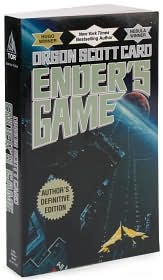
On the earth of Ender's Game, aliens have already made contact. They've already attacked, in fact, and nearly won not once but twice. The government is determined that the third battle will be the final battle, one that earth will win. To that end, the military has been training children in the desperate hope of finding a future leader who will lead the armies of earth to the ultimate victory. The highest contender for this position is Ender Wiggin, genius among geniuses at the tender age of six. Ender is, without a doubt, an extraordinary child. He's so quick to learn that he catches on to every "game" that his adult instructors throw at him as they train him in the space-age fighting techniques that he masters faster than anyone else. But as year after year passes in battle games, Ender struggles to make sense of the warlike boy that he's become--and all the while the very real threat of invasion and defeat looms over his young head. Ender's fight to make his own choices in a world that has already predetermined his role will resonate with readers of every age. Ender's Game won the two highest awards given to science fiction, the Hugo and the Nebula Awards, and for very good reason. Orson Scott Card followed up this feat with his sequel, Speaker for the Dead, which goes deeper into the story of the alien race that threatens Ender's world.
The Hitchhiker's Guide to the Galaxy by Douglas Adams, 2004, Harmony Books, originally published 1979 (Science Fiction/ Fantasy/ Humor)
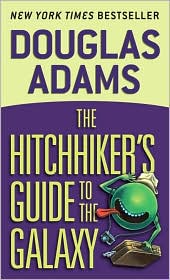
"DON'T PANIC." Its advice that villagers from The War of the Worlds might have disregarded as they ran from the attacking Martians, but it's a reassuring message to readers of a very friendly, very helpful book called The Hitchhiker's Guide to the Galaxy. This strange book is Arthur Dent's only guide to the life he now finds himself leading. He woke up this morning, you see, to find his house being demolished by a local construction crew and his planet being demolished by an intergalactic construction crew, and his friend Ford Prefect yanking him out of the way of both. Now Arthur is on a spaceship with Ford, who's really an alien doing research in the guise of an out-of-work actor; Zaphod Beeblebrox, the dazed and confused two-headed President of the Galaxy; Veet Voojagig, an alien grad student obsessed with all the pens he's lost; Marvin the chronically-depressed robot; and pretty Trillian, a earthling who Arthur once hit on at a party and now Zaphod's new girlfriend. And what this motley crew seeks is no less than the answer to The Ultimate Question: What is the meaning of life? And where did all Veet's pens go? Readers will laugh aloud as The Hitchhiker's Guide to the Galaxy introduces Arthur to alien creatures like the language translating babelfish and the horrid poetry-writing Vogons. Satirical, nonsensical, inventive, and wildly popular, The Hitchhiker's Guide to the Galaxy is one of the most delightful fusions of science fiction and comedy to be read on any planet in the universe.
Deception Point by Dan Brown, 2001, Pocket Books (Fiction/ Thriller/ Mystery)
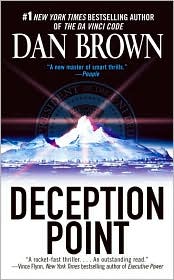
NASA, after several embarrassing incidents that have done absolutely nothing to advance the exploration of space, has finally struck it big. Deep in the arctic ice, scientists have found a meteor containing fossils. And a big rock from outer space with the remains of creatures in it can mean only one thing: Proof of extraterrestrial life. Intelligence agent Rachel Sexton and oceanographer Mike Tolland are thrilled and eager members of the team sent by the President to validate the alien find. They're taken on a whirlwind tour of the discovery site and presented with proof after proof by the equally excited NASA science team. And then, even as the President prepares to announce the news to a breathlessly-awaiting public, doubts begin to set in. Soon Rachel and Tolland are running for their lives across the frigid landscape, desperate to separate fact from fiction before it all blows up in their faces. And the reverberations of what they find will shake the walls of NASA, the White House, and the top-secret National Reconnaissance Office. Talk about alien conspiracies! High tech thrills, military secrets, and cunning politics are just a few of the ingredients in this thriller from the bestselling author of The Da Vinci Code and Angels and Demons.
The Sparrow by Mary Doria Russell, 1997, Ballantine Books (Fiction/ Science Fiction)
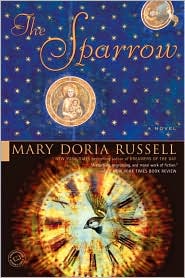

No comments:
Post a Comment